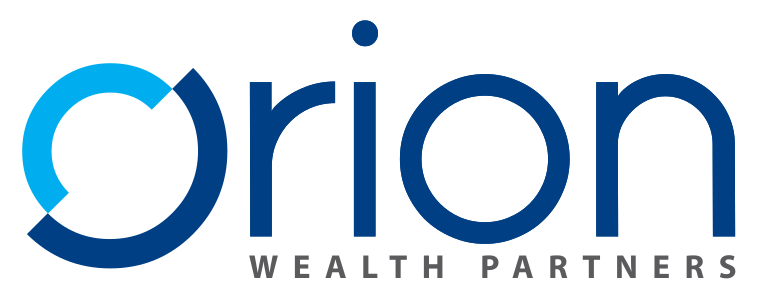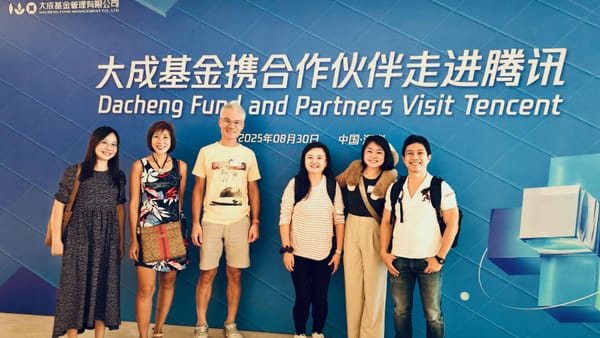From Uncertainty to Independence: Why Investment Advisory could be the most Resilient Career Move
An In‑Depth Interview on Investment Advisory as a Sustainable, Resilient and Rewarding Career
We have invited Clifford to share his personal views on Financial and Investment Advisory freely. His experiences are true for Orion Wealth Partners and may be true for his financial advisory firm, finexis advisory, but may not be representative of other financial advisory firms and financial institutions.
Interviewer: We keep hearing about layoffs, restructuring, and now AI replacing jobs. Is the workplace really changing that fast?
Clifford: Absolutely. I recently had coffee with a former colleague — sharp, reliable, well‑liked and superb in IT. His role was made redundant, not because he under-performed, but because his company adopted AI tools that could do in minutes what used to take him days.
And he’s not alone. Across industries, AI is automating routine tasks, streamlining processes, and in some cases replacing entire functions. For some, AI has made their work more efficient; but for others, it’s made them expendable. Even if your job isn’t replaced outright, it can be reshaped so drastically that the skills you’ve spent years honing suddenly is worth less.
"In today’s world, the most dangerous career move is assuming your job is secure."
As Singapore’s Prime Minister, Lawrence WONG, recently warned, we’re entering “a more troubled and turbulent world” — one where protectionism is rising, free trade is no longer a given, and companies are tightening belts in the face of slowing growth, inflation, and tariffs.
Layoffs and restructuring have become routine. Even if you survive the cuts, you may find that promotions and rewards are dictated less by the value you bring, and more by office politics. Job security feels like a relic of the past.
Have you thought about it — are your current skills still relevant in a world where AI is reshaping entire industries?
Interviewer: That’s a sobering picture. How does this tie into the case for financial and investment advisory?
Clifford: Before we even talk about a financial consultant career path or investment advisory as a career, we have to acknowledge the need for it as a service. Financial literacy is shockingly low. Many people work hard for their money, but their money is unemployed. Savings sit idle, investments are poorly chosen, and scams claim victims every day.
"Financial literacy isn’t a luxury. Without it, families are one bad decision away from disaster."
Without proper planning, families are exposed to financial accidents, high‑risk instruments, and poor decisions that can wipe out years of effort, even decades of savings. That’s where a good financial consultant steps in: helping clients protect and grow their wealth, avoid costly mistakes, and plan for a stable future.
And here’s the part that excites me: in doing that for others, you’re also building something for yourself — a business you own, with no income ceiling, no office politics (if you join Orion Wealth Partners), and the freedom to decide how far you want to grow.
Interviewer: What first drew you to this profession? Was there a turning point?
Clifford: I’ve always believed in the need to manage finances well, but I noticed how many people — even smart, hardworking ones — were financially unprepared. I saw friends lose years of savings to bad investments or scams. I too sunk part of my savings into a local bank's product and only got back half of my capital. I realised that we all needed better quality advice.
The turning point was when I helped a friend restructure his finances and avoid a major financial crisis. He went from mounting debts, being on the brink of losing his home, and maybe even his marriage, to having a clear, sustainable plan. That’s when I knew this was more than a job — it was a calling.
Have you ever helped someone make a financial decision that changed their life — or wished someone had helped you?
Interviewer: In a volatile economy, how can you be sure this career is resilient?
Clifford: Truly, there's no such thing as certainty. But the COVID‑19 pandemic was a tremendous test. When face‑to‑face meetings became impossible, many in the industry froze. finexis didn’t. We quickly rolled out new online systems and non‑face‑to‑face initiatives almost overnight. Our financial advisory representatives moved online and clients were served without missing a beat.
We had systems and an action plan, and even helped peers in insurance companies to adapt. I helped business-owner clients — those who were open to learning — explore how to move online. Some took my advice, expanded their businesses beyond Singapore, and actually grew revenues during the pandemic! We also conducted many free workshops to help clients and their friends — many of whom had lost jobs — find new opportunities in the digital economy. I was very encouraged and impressed by the finexis management and my Orion colleagues, who gave selflessly and we impacted many lives through the pandemic.
"In times of trouble, people don’t need more noise — they need an advisor they can rely on."
We didn’t just survive — we grew. Because in uncertain times, people need financial guidance more than ever. This profession isn't just resilient, it’s essential.
When the next crisis hits, will your career be part of the solution — or part of the fallout?
Interviewer: How does this career compare to a traditional job as an employee in terms of lifestyle and rewards?
Clifford: The biggest difference is the freedom and control I have over my work. I choose how to structure my day, which clients I partner with, and the pace at which I grow my business. My time is spent on meaningful conversations and building relationships, rather than being tied up in endless internal meetings.
This autonomy has allowed me to deepen my specialisation in investments and create a recurring income stream, so I’m not starting from zero each year. Since the early days, it took significant effort and discipline to build that foundation, but now it gives me more stability to take time off without worrying about my income collapsing. It’s a lifestyle that rewards the work I’ve put in and gives me the flexibility to live on my own terms.
Contrasting that with my previous roles — even at the executive management level, I had far less control over the direction of each business. I could deliver strong revenue growth and a winning quarter, yet my income as an employee was limited and not truly proportional to the company’s profits. That lack of alignment between effort, reward, and security was a key factor in my decision to take this career path.
What would more freedom and control over your time mean for your life — and your family’s?
Interviewer: Let’s talk about the rewards. How does someone actually achieve financial independence in this career?
Clifford: It’s not about clocking the longest hours — it’s about doing good work. That means earning trust, delivering value, and becoming the person clients insist their families and friends consult.
The smartest consultants build recurring investment income by growing their Assets Under Advisory (AUA). That creates a stable revenue base each year, and every new client and investment adds to it. Over time, your income compounds — a core principle in passive income creation strategies.
"The smartest consultants build recurring income — so every year, they start ahead, not from zero."
Some financial consultants earn $10K a month; others over $100K a week. There is no limit — but you need to build Trust, take Ownership and be constantly energized by your Purpose.
Interviewer: What does “good work” look like in practice?
Clifford: It isn't about selling a product. You have to listen deeply, understand your client’s needs, and sometimes challenge their misconceptions — respectfully. Many of your potential clients may come in with preconceived ideas about money that are illogical or even dangerous.
"Good work isn’t about selling. It’s about solving problems and earning trust that lasts decades."
I tell my team: you meet a client, you find a problem, you realize it’s big and there's a big critical gap that needs fixing. Often, the solution is simple and cheap if addressed early — but you still need to help the client see it for themselves. Like a skilled doctor, you must disclose the facts with respect and tact. This way, you build trust that lasts decades in wealth advisory services.
Interviewer: What were your biggest challenges starting out, and how did you overcome them?
Clifford: Rejection was the hardest. Most days, you hear “no” far more than “yes”. I had to learn that a “no” often means “not now” — and that persistence, paired with genuine care, eventually wins people over.
I also had to unlearn my own biases about money. If you can’t manage your own finances well, it’s hard to convince others to trust you with theirs. So I became my own first client — applying the sound principles I now teach.
For example, I invest my own money into the strategies. I track how each strategy performs through market cycles and demonstrates sustainable advantage versus their peers. I only advocate strategies I've seen work. This approach has been key to building credibility in investment advisory services.
Interviewer: Can you share a client story that really stayed with you?
Clifford: One client came to me after losing a large sum in an investment promoted by a social influencer. He and his spouse were devastated and had lost faith in financial professionals. Over time, through careful planning and transparent communication, we rebuilt their portfolio — and their trust.
This is a topic for another day: many social influencers have found that dishing out financial advice online attracts audiences and is lucrative. But they are not financial professionals and definitely not MAS-licenced. Always take what you see and hear online with a big dose of caution.
Years later, that couple introduced their children to me. Now, I am advising the young adults as well. That’s when I realized the true measure of success in this career isn’t about numbers — it’s when you become deserving to be entrusted with a family’s future.
Interviewer: With AI and technology evolving so fast, how do you see the role of a financial consultant and investment advisory changing?
Clifford: AI will make certain tasks faster — portfolio analysis, data gathering, even some client reporting. But it can’t replace the human element: understanding a client’s fears, motivations, and life goals.
"AI can replace tasks — but it can’t replace trust."
In fact, AI and financial advisory will increasingly work hand‑in‑hand. Technology will make great consultants even more valuable, because we’ll spend less time on admin and more time on strategy, education, and relationship‑building. The consultants who thrive will be those who combine tech‑savvy with empathy and good strategy, to deliver crucial wealth management advice.
Interviewer: What about people who want to switch careers? Can someone from a completely different background succeed here?
Clifford: Definitely. I’ve seen former bankers, engineers, healthcare workers, hospitality staff, lawyers, pilots, even teachers thrive in this field. The key is mindset — being willing to unlearn, learn, and adapt.
In my previous career, I was a senior executive with illustrious achievements in technology, earning a Masters in machine learning (AI) and advanced certifications in enterprise security (CISSP) and launching successful tech ventures. I was determined to succeed in this career switch, so I challenged myself to out-learn and out-innovate all my peers.
"I was determined to succeed in this career, so I challenged myself to out-learn and out-innovate all my peers."
In fact, people from other industries often bring valuable skills: teachers are able to explain complex ideas simply, engineers and computer scientists are methodical problem‑solvers, hospitality professionals excel at building rapport. Combine your strengths with the solid financial advisory training in finexis and a passion to serve, and you can do very well.
What strengths from your current career could help you succeed in a new one — if you had the courage to switch?
Interviewer: This all sounds promising, but surely it’s not for everyone?
Clifford: Definitely not. You need to know the realities:
- Income uncertainty — at the start, there's no guaranteed paycheck while you build your base.
- Rejection handling — you’ll hear “no” more often than “yes”.
- Self‑driven — you are your own boss, for better or worse. No one's watching over your shoulder.
- Continuous learning — markets shift, tools evolve, and regulations change.
- Emotionally demanding — you’re dealing with people’s life savings and dreams.
If that sounds daunting, that’s because it is. But for the right person, those challenges make the rewards even more meaningful.
Interviewer: If someone is considering this career, what’s the first step they should take?
Clifford: Start by educating yourself — not on financial products, that's the lowest value — but on the fundamentals of planning, importance of investing, and risk management. Talk to people in the industry. Shadow an Orion consultant if you can. And be honest with yourself about whether you’re able to face rejection, willing to keep learning, and committed to putting clients’ interests first.
Interviewer: And final question — what would you say to someone stuck in a job they no longer trust to provide stability?
Clifford: If you’re tired of uncertainty — whether it’s from economic turbulence, corporate politics, or AI reshaping your role — a career in wealth management in Singapore offers a path that is sustainable, resilient, and deeply rewarding.
This is not easy. But if you’re willing to learn, adapt, and serve with integrity, it could be the most rewarding career decision you ever make.
"If you’re willing to learn, adapt, and serve with integrity, it could be the most rewarding career decision you ever make."
Imagine waking up on a Monday morning with no dread in your stomach. Your calendar is full — not with pointless meetings, but with conversations that matter. You’re meeting clients who trust you, who thank you for helping them sleep better at night, who introduce you to their friends because they want them to have the same peace of mind.
Your income is uncapped. Your schedule is yours. And the work you do today will continue paying you years from now. This isn’t a fantasy — it’s the reality for those who have built a career in investment and financial advisory.
If you could rebuild your career from scratch, what would you do differently — and what’s stopping you from starting now?
About Clifford
Clifford CHEW didn’t set out to become a financial consultant — but seeing friends and colleagues lose their sense of security to economic downturns, corporate politics, and rapid technological changes, he sought a better way to build a stable future. He embarked on what he now considers a more meaningful and sustainable career.
Today, Clifford is a seasoned financial and investment advisory leader with years of experience helping individuals, families, and business owners protect and grow their wealth. Known for simplifying complex concepts and building deep, trusted relationships, he has guided clients through market booms, a pandemic, economic and geopolitical upheavals, and the technological shifts reshaping the global economy.
Specialising in Investment Strategy, Passive Income Creation and Wealth Advisory, Clifford has built a practice grounded in trust, transparency, and measurable results. Beyond advising, Clifford mentors new consultants, sharing the mindset, skills and strategies needed to thrive in a profession that offers not just income potential, but also the privilege of making a lasting impact in people's lives.
When he's not working with clients, Clifford is passionate about financial education, regularly speaking at seminars and sharing at community events. He contributes thought leadership on how individuals can achieve financial independence in an unpredictable world.




